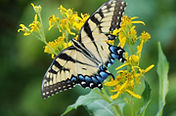Sumac (Family Anacardiaceae)
Anacardiaceae (the Cashew Family or the Sumac Family) is a family of
flowering plants, mostly trees and shrubs, with about 70 genera and 600
species.
The Cashew Family is more abundant in warm or tropical regions with
only a few species living in the temperate zones. Mostly native to
tropical Americas, Africa and India. Pistacias and some species of
Rhus can be found in southern Europe, Rhus species can be found in
much of North America and Schinus inhabit South America exclusively.
Its numerous genera include several of economic importance. Notable
plants in this family include cashew and pistacia nuts, mango and marula
fruits, poison ivy, sumac, and smoke tree. Some members produce a
viscous or adhesive fluid which turns black and is used as a varnish or for
tanning and even as a mordant for red dyes. Medicinally the edible nuts
from this family have a reputation for being good for the brain.
Park Activities
Calendar of Events
Volunteer Programs
Sky Meadows Park
Location
Geography
Habitats
Trails
Visiting Park
Crooked Run Valley
Special Projects

